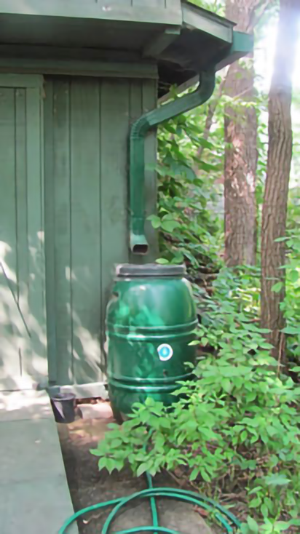Saving living space for living
things one yard at a time
Rain Barrels Word for the Natural Environment and Save Money!
Using rainwater protects our environment. Doing so reduces strain on urban storm drains and streams, reduces demand for tap water, and decreases the burden on water treatment facilities and the need for sewer expansion. If you pay for water, remember that in the summer forty percent of that water goes to the garden and lawn. Just one inch of rain on a 1000 square-foot roof yields 623 gallons of water. Rain barrels can capture this precious resource and prevent our wasting it.
Rain barrels collect and store rainwater from the roof by redirecting its flow. Although they come in various sizes, most barrels are 55-gallon, plastic, food-grade drums, each with an outflow spigot and a screen for the top to keep out debris and curious creatures, like kids. The containers are rot resistant and opaque to prevent algae growth. Install them 15” off the ground to accommodate a watering can under the spigot and to facilitate gravity flow. You can provide a hose to reach gardens, and you can link a series of barrels.
The barrel is placed near a downspout, and water is directed into it either by the downspout or a rain chain. Proper leveling and weighting the top or securing it to the house help prevent half-full barrels from tipping in high winds. In the winter, you must drain and store it or protect it because any water will freeze and could crack the container.
One source for rain barrels is McHenry-Lake County Soil and Water Conservation District, www.mchenryswcd.org, which offers them for $65.00 and also has components like diverters. Theirs are recycled 55-gallon pickle barrels fitted with spigots and in various colors, or you can paint them with your own design. Private businesses also sell rain barrels.
Rain provides nature’s distilled water, soft and without additives. Not just for the garden, you can use the water to wash pets, autos, or windows and to water houseplants. Save even more water by planting water-efficient native species, a double delight for living things!

